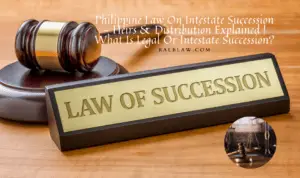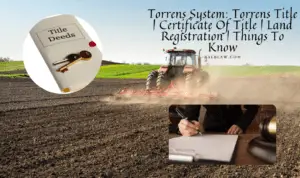The testament and the will of the testator may have been like the decedent was speaking even after his death. Men wished to speak after they were dead and the law, by the creation of the last will and testament, permitted them to do so.1
Certainly, when a man dies all that what is left in this world is his property, setting aside the memories that he have made with all the people he build friends with, as well as his family members and relatives.
Death is inevitable. When that day comes, the relationship of the person with his possessions is severed. Be that as it may, the properties left behind by a person will naturally court the interest of anyone especially those who have knowledge of these properties.2
The will of the testator
The law governing the wills and succession has on its purpose the duty to have the people become knowledgeable on the importance of creating and writing a last will and testament. It is not only for the testator and his heirs but also to protect the property from unknown interests from unknown person.
In cases where in a person died intestate, the probate court is responsible for the distribution of the deceased assets. A probate lawyer is the witness of all the family dispute over the property of the deceased, he all know the hidden stench on the parties claiming to have their interests over the property of the deceased.
The settlement of a person’s estate after his/her death is potentially one of the more bitter litigations. It’s never good to see relatives fighting each other. Some persons, with the intent of controlling the disposition of his/her properties after his/her death (and hopefully prevent fighting among his/her heirs over the properties left), prepare a “last will and testament”.3
It is a very sad phenomena that when a man comes to a certain point of his life where he will write his last will and testament, it is both sentimental and sorrowful. However, his last will and testament will dictate whether there may exist a permanent tranquility over the situation of his heirs especially if they are in dispute over the properties even when the testator is alive, and also when he is already dead.
There are cases wherein even the testator is still alive and has not planning to make a last will and testament but his heirs are already in dispute on whether who will be the heir of the properties of their parents or how will the properties be distributed to them.
From the viewpoint of the testator, it is somehow heart-breaking, seeing his children having a dispute over his properties by which he have not yet come up to an idea of disposing them in favor of his children in the first place.
However, this is somehow the nature of life, a children will later on have their own interests over the property, as miserably as it may sound but it is happening in real life and again, it is dictated by the human nature, that there comes a time that he will part ways not only with his love ones but also with his properties, as it is the only material thing that will left after a person died.
Testamentary act
A will is an act whereby a person is permitted, with the formalities prescribed by law, to control to a certain degree the disposition of this estate, to take effect after his death.4
From this provision of law, we can find out that a last will and testament is a written document pertaining on how a person will disposed of his properties, whether in favor of someone may be his family or friends or whom is not among his blood relatives or among his child.
A last will and testament is a written document that is bound to follow the formalities set-forth by law. It is a written document that will only attain its life after the death of the testator, provided that it has complied with the formalities prescribed by law.
When a person dies his properties will become a source of so many interests from different persons and entities not only his heirs but also the State through escheat proceedings. Although it is not being mandated nor a requirement to anyone, securing a last will and testament will quiet those who has some evil interests over the properties of the testator when it comes to determine who are the rightful heirs.
Successors
A last will and testament will only have its effectivity after the death of the testator, during his lifetime the last will and testament is only a lifeless piece of paper waiting for his perfect time to be given effect.
There are cases when the testator is impaired to write his last will and testament due to old age or is just incapable of doing so. It is frustrating to know that, at this time where the testator is most vulnerable, there are heirs that will see it as an opportunity. This may be to advance their evil motive and compel or fraudulently deceive the testator to have them in their favor the contents of the last will and testament. Testate inheritance is not considered a natural right.5
Rather, it is a right granted by law. For this reason, the exercise of this right is subject to the conditions set by law.6 It is a fundamental principle that the intent or the will of the testator, expressed in the form and within the limits prescribed by law, must be recognized as the supreme law in succession.7
Making a will is a personal act
No one can compel a testator to make a last will and testament that will contain something favorable to them but against the will of the testator, nor can anyone fraudulently deceive the testator. The right of heirs to the property of the deceased is vested from the moment of death. Of course the formal declaration or recognition or enforcement of such right needs judicial confirmation in proper proceedings.8
In Re will of Abangan [40 Phil., 476],9 this court said:
“The object of the solemnities surrounding the execution of wills is to close the door against bad faith and fraud, to avoid substitution of wills and testaments and to guarantee their truth and authenticity.”10
Hence:
“Therefore, the laws on this subject should be interpreted in such a way as to attain these primordial ends. But, on the other hand, also one must not lose sight of the fact that it is not the object of the law to restrain and curtail the exercise of the right to make a will. So, when an interpretation whatsoever, that adds nothing but demands more requisites entirely unnecessary, useless and frustrative of the testator’s last will, must be disregarded.”11
A person’s last will and testament is also his dying wish, it is his last wish before he parted ways with his loved ones permanently, he wants to see that his heirs will come finally at peace and tranquil and not be in a never-ending dispute over a piece of property.
Studying the law on wills and succession will drive someone’s emotion to a roller coaster ride, and we cannot even erase the fact that it will all happen to anyone of us at some point of our lives, to finally write a last will and testament.
At some point, it is a test to determine how solid the family ties are, it will test them on how they see each other as a lawful heir of the testator. There are family relations that were shattered apart by the last will and testament because of a make-believe that while the testator was still alive he or she was his favorite and relying too much on that belief and ended up in vain.
The last will and testament from the viewpoint of the heirs may sometimes a competition on who is the best, who is the deserving and who is the loving, completely denying the fact that it can also be shared equally.
Permissible exceptions
The testator may entrust to a third person the distribution of specific property or sums of money that he may leave in general to specified classes or causes, and also the designation of the persons, institutions or establishments to which such property or sums are to be given or applied.12
From the wordings of the law, we can deduce that there are things that may be delegated to a third person designated by the testator. Certainly, the substantial aspect of the last will and testament is solely lodge to the testator, however, when it comes to its implementation it can be delegated to a third person.
The distribution of the property in favor of any person designated by the testator may be delegated to a third person based on the wordings provided by the aforementioned provision of the Civil Code. Worthy to note is that what is to be delegated is the implementation of a testamentary disposition the exercise of which is non-delegable to any third person nor subject to their discretion.
A testator’s last will and testament is personal to him, it cannot be made by someone else other than him. The contents of the last will and testament such as the property, its specifications or amount of money (if the last will and testament is monetary) to be given as well as the class or cause to be benefited must not be provided by any third person.
Nonetheless, the implementation of the last will and testament such as the designation of persons, institutions, or establishments within the class or cause and the manner of its distribution may be delegated to a third person designated by the testator.
The provision of the Civil Code provides that the beneficiary is a specified classes or causes, one good example of a class institution that may be a beneficiary of a last will and testament is under Article 1030 of the Civil Code of the Philippines:
“Testamentary provisions in favor of the poor in general, without designation of particular persons or of any community, shall be deemed limited to the poor living in the domicile of the testator at the time of his death, unless it should clearly appear that his intention was otherwise.13
“The designation of the persons who are to be considered as poor and the distribution of the property shall be made by the person appointed by the testator for the purpose; in default of such person, by the executor, and should there be no executor, by the justice of the peace, the mayor, and the municipal treasurer, who shall decide by a majority of votes all questions that may arise. In all these cases, the approval of the Court of First Instance shall be necessary.14
“The preceding paragraph shall apply when the testator has disposed of his property in favor of the poor of a definite locality.”15
When a testator assigns and delegates to a third party the responsibility of identifying the recipients of a bequest made to a class, all that the testator has entrusted to the third party is the technical task of distributing the assets the testator had set aside for such class.
Writing a last will and testament is a personal matter that cannot be delegated because it is sentimental and sorrowful, and it cannot be subjected to the discretion of any third party who has nothing to do with the soon-to-be beneficiaries. In short, only the mechanical aspects of the process, not the creation or writing of the last will and testament, can be delegated to a third party.
Final thoughts
Finally, writing a last will and testament is something to be taken seriously; it is the person’s final written word, with the hope of leaving the world without worrying about what will happen to his loved ones and his property. As in any movie, “it’s a wrap,” this is the end of one’s life journey, where he will settle all doubts and disputes about his properties and who will be the beneficiaries.
This is the testator’s final wish, and a wish is supposed to be granted, especially if it is his last. We have been thinking about how to value things that may come into our possession since we were children; this is the essence of a will, to have someone continue to take good care of the property that a person has valued his entire life.
- Ancheta vs. Guersey-Dalaygon, G.R. No. 139868, June 8, 2006[↩]
- Last Will and Testament | For Guidance and Understanding, RALB Law[↩]
- Last Will And Testament In The Philippines: Basic Discussion[↩]
- Article 783, New Civil Code of the Philippines[↩]
- Nuguid vs. Nuguid, G.R. No. L-23445, June 23, 1966[↩]
- Philippine Inheritance and foreign Wills[↩]
- Seangio vs. Reyes, G.R. Nos. 140371-72, November 27, 2006[↩]
- Treyes vs. Larlar, G.R. No. 232579, September 08, 2020[↩]
- G.R. No. L-13431, November 12, 1919[↩]
- Ibid.[↩]
- Ibid.[↩]
- Article 786, New Civil Code of the Philippines[↩]
- Article 1030, New Civil Code of the Philippines[↩]
- Ibid.[↩]
- Ibid.[↩]




